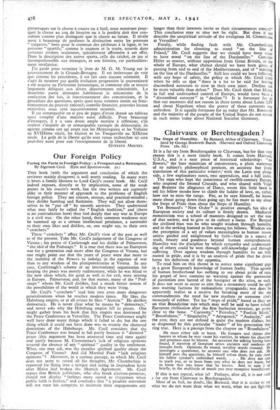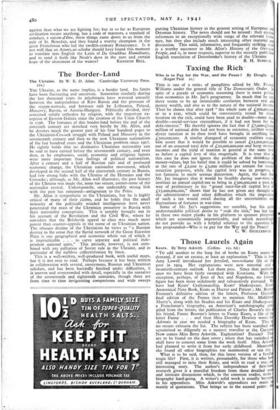Clairvaux or Berchtesgaden ?
IT is a far cry from Berchtesgaden to Clairvaux, but for that very reason this is a most timely book. It comes from Harvard, U.S.A., and is a neat piece of historical scholarship: "no flowers," the bare minimum of commentary, a plain statement of its subject's philosophical position, an accurate but lively translation of this particular treadle, with the Latin text along. side, a few explanatory notes, two appendices, and a full index.
The man who kept the conscience of twelfth-century Europe, who inspired the Second Crusade, and who shared with Virgil and Beatrice the allegiance of Danie, wrote this little book to tell his fellow monks how to climb the ladder of love, or, rather, how not to miss the rungs. For, as he says himself, he knows more about going down than going up; he has more to say about the Steps of Pride than about the Steps of Humility.
Yet Bernard's "New Order " is positive enough, his idea of European society and its culture is firmly drawn. Mediaeval monasticism was a school of manners designed to set the tone of that society, and to give CO its culture a focus. For Bernard the civilised man was he who sought wisdom through humility, and in the seeking learned to live among his fellows. Wisdom was the perception of a set of values meaningless to human reason unless guided and enlightened by faith—faith in a source of truth, beauty and goodness beyond human comprehension. Humility was the discipline by which sympathy and understand. ing of others could be won through self-knowledge and through suffering. Over against wisdom through humility he set folly rooted in pride, and it is by an analysis of pride that he drives home his definition of the opposite.
To read him on this theme is to notice some significant gaps in a great European's knowledge of human frailty. This apostle of human brotherhood has nothing to say about pride of race, his gospel of love contains nc warning against the perversion of patriotism into hatred of the foreigner or the alien, as such. It does not seem to occur to rum that a monastery could be split into warring factions by nationalistic propaganda; nor does he apparently realise as a motive for breaking most of the ten commandments the need for new markets or someone else's monopoly of rubber. Yet his " steps of pride," based as they are on that Benedictine rule which may well be said to have rebuilt European civilisation after the first barbarian invasion, go pretty close to the bone. " Curiosity," " Frivolity," " Foolish Mirth," "Boastfulness," " Singularity," " Arrogance," " Audacity," and the rest; they are not defined in quite the modern dialect, but as diagnosed by this particular " leader " of his generation they ring true. Here is a passage from the chapter on " Boastfulness."
He must either talk or burst. He hungers and thirsts after hearers to whom he may vaunt his vanities, to whom his character
and greatness may be known. An occasion for talking having been found, if mention of literature arises ancients and moderns are
brought forth. Opinions fly round, weighty words resound. He interrupts a questioner, he answers one who does not ask. He
himself puts the questions, he himself solves them, he cuts short his fellow speaker's unfinished words. . . . He does not care to teach you, or to learn from you what he does not know, but to know that you know that he knows. And to sum it up briefly, in the multitude of words you may recognise boastfulness.
If this is not topical, what is? Perhaps, after all, it is not such a far cry from Clairvaux to Berchtesgaden.
Most of us feel, no doubt, like Bernard, that it is easier to say what we do not want than what we want, what we are fighting against than what we are fighting for; but in so far as European civilisation means anything, has a code of manners, a standard of conduct, a raison-d'être, these things came down to us from the rule of St. Benedict, and they found a worthy champion in the great Frenchman who led the twelfth-century Renaissance. Is it not well that an American scholar should have found this moment to translate into English the Latin of De Gradibus Humilitatis, and to send it forth like Noah's dove in the sure and certain
hope of the abatement of the waters? KENNETH BELL.































 Previous page
Previous page